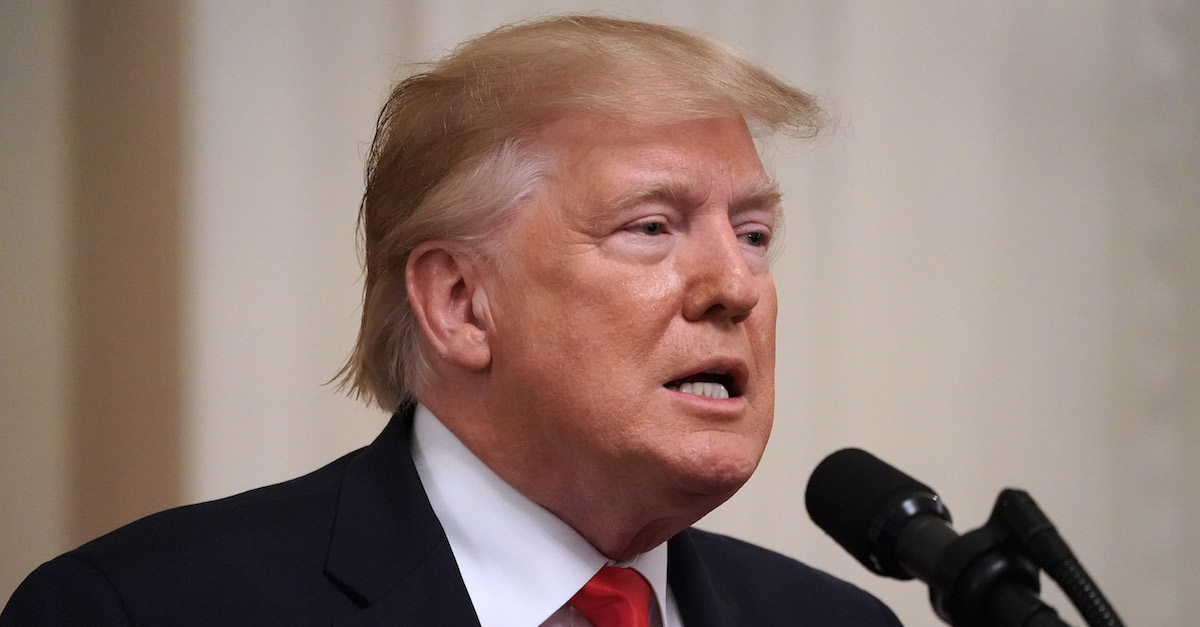
President Donald Trump’s “approved” super PAC made up to $6.6 million dollars in illegally coordinated expenditures to various GOP congressional candidates in 2018, according to a complaint filed Friday by a non-partisan government watchdog organization.
A 339-page complaint submitted with the Federal Election Commission (FEC) by Campaign Legal Center (CLC) alleges that Trump-aligned America First Action (AFA) made such unlawful contributions to former Texas representative Pete Sessions, as well as Senators Josh Hawley (R-Missouri) and Matt Rosendale (R-Montana).
The massive complaint outlines the issue:
During the 2018 election cycle, AFA spent millions of dollars on independent expenditures supporting [Sessions, Hawley and Rosendale] and distributed and placed those advertisements using the same firm—and in some cases, the same employee—that was strategically placing the campaigns’ own advertisements.These coordinated communications 2ensured that spending by both AFA and the campaigns it supported would be complementary and advance a unified, coordinated election strategy.
The firm used by the super PAC itself is Red Eagle Media Group. Red Eagle shares the same staff with another GOP firm–and the same address. A second firm–American Media & Advocacy Group–was used by the Sessions, Hawley and Rosendale campaigns to place their own ads. In multiple instances, however, the ad buys for the three campaigns and AFA were made by the exact same people.
“In each of those federal races, Federal Communications records show repeated instances of the same high-ranking National Media employee placing ads on behalf of both AFA and the candidates that the super PAC was supporting, and on the same TV stations,” the CLC complaint notes. “In some instances, the same National Media employee placed ads on behalf of both AFA and the campaigns on the same station and at the same time.”
And some of that money spent came from Rudy Giuliani‘s Ukrainian hatchet men Lev Parnas and Igor Fruman.
“CLC has documented how Sessions met personally in May of 2018 with two Rudy Giuliani associates, Lev Parnas and Igor Fruman, during the same period they were illegally routing $325,000 to AFA,” a press release accompanying the complaint notes. “After that meeting, Sessions sent a letter urging the removal of the U.S. ambassador to Ukraine. AFA would go on to spend millions in Sessions’ 2018 race, some of it illegally coordinated.”
Federal rules prohibit coordinated communications between a candidate–and/or said candidate’s authorized campaign committee–and outside expenditure groups like super PACs.
CLC alleges that AFA and the three GOP campaigns unlawfully coordinated contributions between one another because those $6.6 million worth of payments came from the super PAC and were made on the campaigns’ behalf by essentially the same individuals operating under different legal entities in name only.
Again the complaint (citing federal campaign finance law):
The evidence indicates that [Red Eagle and American Media & Advocacy Group] made use of its knowledge about the “plans, projects, activities or needs” of the campaigns to most effectively place the AFA ads supporting those candidates,and that such information was “material to the creation, production, [and] distribution of the communication[s].”
Brendan Fischer is CLC’s Director of Federal Reform. In an email to Law&Crime, he blasted the alleged coordination scheme as more of the same from GOP-aligned outside expenditure organizations.
“President Trump’s super PAC has replicated the coordination scheme first pioneered by the NRA,” Fischer said–referencing the conservative organization’s use of a shell company to finance GOP campaigns in 2014 and 2016. CLC also filed a federal complaint over that scheme.
“AFA may only raise and spend unlimited amounts in elections if it is completely independent of the candidates it supports, and AFA is not independent if the same person placing ads for those candidates is also placing ads on behalf of AFA,” Fischer continued. “The super PAC might claim that its media buyer established a firewall, but that argument doesn’t fly when the same person is buying the ads for both – a person cannot create a firewall in their own brain.”
[image via Chip Somodevilla/Getty Images]